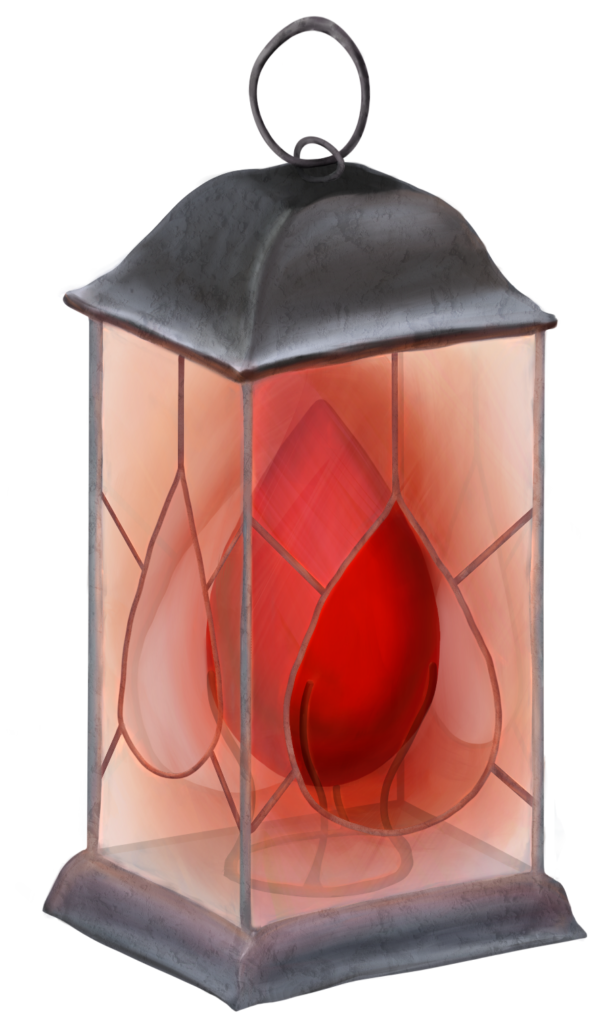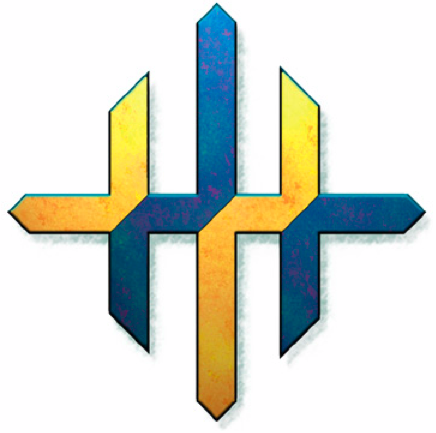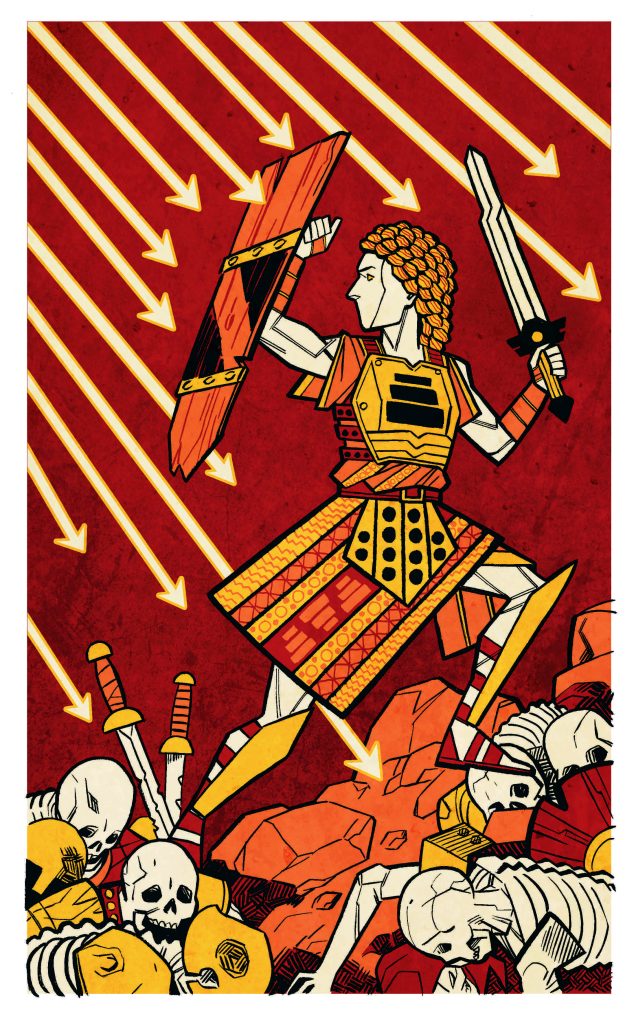
When time allows, I like to answer interesting questions from my patrons. This has been an exceptionally busy month and I’ve largely only been able to answer questions on my Patreon, but I’m going to try to get to a few more this week, starting with this one.
The Blood of Vol asserts that everyone has the potential to become a god, but that no one actually has yet. How does this appeal to a commoner? Maybe a player character can believe that they’ll be the first one to do it, but isn’t this kind of like saying it’s a religion in which no one’s ever made it to heaven yet, but hey, maybe you’ll get lucky?
So the first thing to recognize is that the typical Seeker (someone who believes in the Blood of Vol, short for “Seeker of the Divinity Within“) doesn’t expect to become a god. A basic principle of the faith is that we all could become gods, but that the curse of mortality was created to prevent us from doing so—that you will die before you can unlock your true potential. It’s not a question of “maybe you’ll get lucky.” You won’t get lucky. You will die first. That’s literally why death exists. That’s not the goal of the faith.
So what is the goal of the faith? Let’s look at the basic principles presented in Eberron: Rising From The Last War.
- Everyone has a spark of divinity. Find that power within.
- Death is the end, Dolurrh is oblivion, and if the gods exist, they are cruel. Stand with those you care for; all we have is this life and each other.
Working backwards, the first thing the Seeker faith does is to provide an explanation for injustice and suffering. Why is there death and disease? Why do our crops fail and our children die? Because the universe is cruel. There’s no benevolent skyfather, there’s no happy afterlife at the end of the rainbow. If there are gods, they’re jealous beings who hoard their power and laugh at our pain. This is why the faith thrives in the harshest parts of Khorvaire; it’s the faith of a people who see suffering every day, and who seek an explanation for it. And that explanation is life is cruel. But what the Seeker faith tells you is to FIGHT. The universe is against us. This life is all we have. So fight for those you care about. Protect your family and your friends, because the world WILL try to take them from you. To be a Seeker is to know that there is misfortune around every corner, to be ever ready for the next plague or famine, because you know the universe will take any chance to screw you over. But it’s also to know that you will not lay down and die… and even if you do die, damn it, let your family animate your corpse so you can keep fighting for them until your bones are ground to dust.
And when it comes to fighting… Everyone has a spark of divinity. Find that power within. The common Seeker doesn’t expect to become a god, to fully unlock their Divinity and to become an omnipresent entity with the power of a Sovereign. But the SPARK of that power is within them… and they CAN draw on that power. This is most obvious in the magic of Seeker paladins, clerics, and adepts. Seekers believe that their divine spellcasters draw power from their own divine sparks. Each Seeker cleric is, in essence, their own deity. But what of the commoner who can’t cast divine spells? Well, consider the Vassal smith, who asks Onatar for guidance when they start their work. Consider the Vassal soldier who asks Dol Dorn for strength and courage in battle. They aren’t paladins or clerics, but they believe that they can get strength and guidance from a higher power. The Seeker soldier or smith believes the exact same thing—except that the higher power is within them. The Seeker knows that they have divinity within their blood… that they CAN perform miracles. They have the courage they need. They have the ability to make the finest sword that’s ever been seen. They don’t need to ask some alien force to help; the power is within them. A Seeker doesn’t ask Olladra for good fortune; they know that they can make their own luck. And if it doesn’t work? Well, that’s the cruel universe for you; spit in its eye and keep fighting.
So how does the Blood of Vol appeal to the commoner? It explains why you suffer. It urges you to defy the cruel fates and to fight for a better life, and it tells you that you have the power you need to fight. It doesn’t promise some gilded afterlife at the end of the road; death is the end. But that is exactly why it urges you to FIGHT for yourself and for everyone you care about. Because this life is all we have. Make it count.
WHY DOES THIS MATTER?
When you’re playing a Seeker, keep a few things in mind.
- Some Seekers believe that the Sovereigns exist and that they are cruel. “As flies to wanton boys, so are we to the gods; they kill us for their sport.” Others believe that there are no deities, that the universe sis simply an impersonal engine of cruelty. Where do you fall on this scale? Do you believe that it’s theoretically possible to some day make the Sovereigns pay for their cruelty, or is the only fight that matters the struggle to survive?
- As a Seeker, you’re always prepared for the worst. You expect nothing but cruelty from the world. Plague, disease, war, greed—whatever can go wrong surely will. You ration your food because there could be a famine next month… and when it happens you’ll be ready. The followers of the Silver Flame are prepared for the fiendish apocalypse; the Seekers are prepared for house fires, flash floods, flu outbreaks, and every other mundane, shitty thing that could happen. So as a Seeker, you’re never surprised when something bad happens. Of course you rolled a 1; the universe hates you.
- … But again, part of what it means to be a Seeker is that you will fight against that cruelty. You’ll extinguish the fire. You’ll save your child from the flood and you will nurse them through the flu. You won’t give the universe the satisfaction of surrender.
- And most crucially, you will fight for everyone you care about. You know that we can’t survive alone. Encourage teamwork. Try to form connections to the people you are working with, because you will need those connections to survive. You may be grim, but you’re not a lone wolf; you recognize the importance of standing with a pack.
- As a divine spellcaster, you believe that your magic comes from within you. You’re drawing on your own divine spark. When you use divination, you’re being guided by the god you could become. Even if you’re not a divine spellcaster, you believe that you have that power within you, that you are being guided by your own divinity. Where others would pray to a higher power and say give me strength, you say I know that I have the strength I need within me.
What about necromancy? The Seeker refuses to surrender to death. We were cursed with mortality by the cruel universe; necromancy is a way to give that universe the finger. You killed my father? Well, he’s right here fighting alongside me. The Seeker faith asserts that death is oblivion and, therefore, there is no reason to have reverence for a corpse; a corpse is a tool, and if it can serve the greater good, that’s something any Seeker would want. Beyond that, Seekers have learned how to channel the energies of Mabar into necromantic rituals as a way to contain the negative environmental effects of those energies; in places like Atur, Seekers make significant use of necromancy because it’s actually vital to the ongoing health of the city.
So as a Seeker you may be grim and stoic. You may expect the worst from the world. But you know that we need to stand together to survive. You value friendship, love, and community, and you will fight fiercely for those you care about. And as seen in Atur, make sure to celebrate the joys of life when you can.
That’s all for now. Thanks as always to my Patreon supporters for making these articles possible, and look for a bigger article later in the week!


